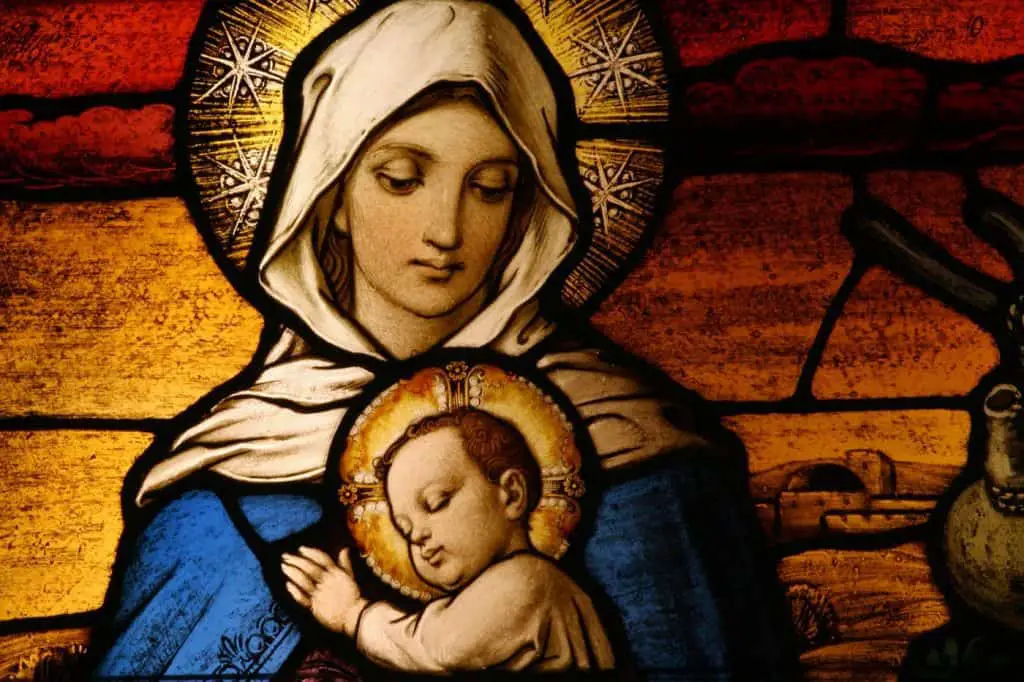Ask a room full of people to describe Jesus, and you’re sure to get a room full of varied answers. Some would be quick to describe him as a compassionate friend. Others see him first as a wise teacher. And a few might envision Jesus as a divine king, preparing to rerun in a display of glory and splendor.
All of these answers are right, but each only offers a small piece of who Jesus is. How can we assemble these and other pieces to get a full picture of Jesus? How does the Bible describe him?
Jesus is the central figure in the Bible, which describes him as both fully God and fully man. The Bible shows Jesus to be both righteous and merciful, both servant and king.
Let’s examine these paradoxes below as we seek a fuller portrait of Jesus.

Where Do We Begin?
The Bible is a big book. Distilling the essence and character of Jesus down to a single summary might be impossible, simply because of the volume of words that have been written about him in the pages of scripture.
We might consider starting with ancient doctrinal statements such as the Apostles’ Creed or the Nicene Creed. While the creeds provide us useful summaries of core Christian beliefs and adequately describe Jesus’ nature and purpose, they reveal little of His character.
Fortunately, in Biblical times, there was a common practice for describing a person’s character that gives us a rich trove of insight into who Jesus is. In ancient Israel, a person’s name was used to describe a key personality trait or aspect of an individual. And the Old Testament prophets supplied us with plenty of names for Jesus.
The Names of Jesus Foretold
For to us a child is born,
to us a son is given,
and the government will be on his shoulders.
And he will be called
Wonderful Counselor, Mighty God,
Everlasting Father, Prince of Peace. – Isaiah 9:6
Each year as Christmas approaches, we anticipate Jesus’ arrival by reading the prophecies that foretell his birth. In one such foretelling, we find four different names given to Jesus.
1. Wonderful Counselor
Some translations render these words as two separate entries. Just the word ‘wonderful’ alone reminds us that Jesus is far from ordinary. He instills in us a sense of wonder because in him we glimpse the divine. Despite coming as a man, he is neither a typical nor an ordinary man.
As our Counselor, Jesus is at once our guide, our helper, and our advocate. ‘Counselor’ is the same word that would be used to describe an attorney. We wouldn’t navigate the complexities of the legal system without the sound advice of one who is knowledgeable and capable. We want the assurance of knowing that our counselor is committed to being on our side, and is both confident and competent to speak on our behalf.
In Jesus, we find all of these things. His sacrifice makes us blameless before God’s throne of judgment and silences the accusations of the enemy. His wisdom guides us in the truth of his righteousness. And his help remains with us as we journey through life.
2. Mighty God
In Jesus, we find the embodiment of all divine power. Through Jesus, God exercised His creative power to bring for the entire universe (John 1:3). And Jesus, by his resurrection, displayed his power over death, a power that only he possesses (1 Corinthians 15:55-57).
3. Everlasting Father
Jesus was present with God in eternity past and remains unchanged into eternity to come. Jesus calls himself the Alpha and Omega, the First and the Last (Revelation 22:13). He has no beginning and no end. He is fully divine and fully immortal.
4. Prince of Peace
Since the fall of man, sin has put humanity into a state of conflict with God. Our brokenness stands in opposition to His righteousness. But through Jesus’ sacrifice, he has reconciled us to the Father, winning for us an everlasting peace with God, our King.
And even though we still live in a world full of war and hostility, Jesus fills our hearts with peace even now (John 14:27). His peace is not conditional, as a treaty between two warring nations. His peace is lasting and secure, defying understanding and securing our hope for eternity.
More from Isaiah
Therefore the Lord himself will give you a sign: The virgin will conceive and give birth to a son, and will call him Immanuel. – Isaiah 7:14
5. Emmanuel
The word ‘Emmanuel’ translates to ‘God with us.’ As God is all-powerful, infinite, and immeasurable, it is easy for us to think of Him as distant and far off. After all, the universe is big, so God must be very busy attending to some far-off cosmic matters, right?
In Jesus, we are reminded that our Creator is not distant and has not forgotten us. In Jesus, we experience God, who takes up residence in our hearts and lives life through us. In Jesus, we commune with God and walk with God, because in Jesus, God is with us.
Eyewitness Accounts
Moving from the Old Testament to the New, we read the writings of those who witnessed Jesus’ earthly life. The gospels are eyewitness reports from people who walked and talked with Jesus. And the epistles provide valuable theological commentary on his life and ministry. Within these pages, we read some very direct statements about the character of Jesus.
6. The Word was God (John 1:1)
John opens His gospel by calling Jesus ‘the Word,’ (Greek Logos). He is the creative power of God, because he is with God, and because he is God. Everything that Jesus said and did has meaning and purpose precisely because he is God, co-equal with the Father. This is the foundational truth on which the entire gospel narrative rests. And speaking of foundations…
7. The Chief Cornerstone (Ephesians 2:20)
Jesus is the foundation for all the church, and for our lives as Christians. It is his strength that holds up the church, with each of us as stones built together by him and with him. And it is his righteousness that aligns our hearts and lives, so that we may be made righteous through him.
8. Apostle and High Priest (Hebrews 3:1)
In the priestly order of the Old Testament, the High Priest was the one who represented the people directly to God. He offered sacrifices and acted as an intercessor on behalf of all. An apostle, we read in the New Testament, is one appointed directly by God to proclaim His message to the people.
Jesus, then, is the spokesperson for us to God, and for God to us. Through him, intercession is made on our behalf to God’s heavenly throne. He provided our sacrifice and delivers our prayers. And as God’s apostle, Jesus speaks with divine authority. In his words reside all truth, wisdom, and righteousness.
9. Lamb of God (John 1:29)
This was the title used by John the Baptist when he introduce Jesus as the one who takes away the sins of the world. It is the lamb’s function to pay the penalty of sin by dying on behalf of another. As the Lamb of God, Jesus offered himself as the perfect, complete, and final sacrifice, erasing the sins of all who believe.
10. Lion of Judah (Revelation 5:5)
Jesus is at once the meekest of animals, the slain Lamb of God, and the mightiest of beasts, the Lion of Judah. He is the most powerful king in David’s line, victorious and unconquerable. By becoming the Lamb, Jesus took on death, and by resurrecting as the Lion, he won the eternal victory over death.
11. The Christ (Matthew 16:16)
It was Peter who first declared that Jesus was the Christ, the very son of God, His appointed Messiah, sent to redeem mankind. But Peter would not be the only one to make this proclamation. Even the centurion who presided over Jesus’ crucifixion saw that Jesus was the Son of God when Jesus breathed his last (Matthew 27:54).
12. King of Kings (1 Timothy 6:15, Revelation 17:14)
Kings are sovereign rulers over their nations and people. And Jesus is sovereign over every king and ruler that the world has known, or ever will know. From the first word of creation to the final victory over death, Jesus has shown himself to be the one true King and authority over all others.
In Jesus’ Own Words
We’ve read a lot about how others describe Jesus, but is there anything that Jesus himself tells us that gives us a fuller picture of who he is? How does Jesus describe himself?
13. I and the Father are One (John 10:30)
Jesus never thought that he was simply a kind man or a good teacher. He was fully aware of his divine nature, and he said so. It is because Jesus is one with the Father that he could describe himself as God’s begotten son (John 3:16). Jesus and the Father share an essence. For this reason, Jesus assures us that anyone who has seen him has seen the Father (John 14:9).
14. I am the Way, the Truth, and the Life (John 14:6)
Jesus does not present himself to the disciples (or to us) as a good option among many. He does not suggest that there are multiple paths to the Father.
Quite the opposite, Jesus declares that he is the only way. No other path works, because only Jesus is the path of truth. And because only Jesus is the path to eternal life, all other paths lead to death and destruction. Jesus says that he himself is the gate (John 10:9). There is no other way in.
15. I am the Good Shepherd (John 10:11)
As the one who stands at the door of God’s sheep pen, Jesus is our shepherd, but he is more than just a shepherd. He is the Good Shepherd because he lays down his life for his sheep. He calls his sheep by name, and willingly stands between us and the wolves and thieves who would try to snatch us from him.
16. A Ransom for Many (Matthew 20:28)
Jesus laid down his life for his sheep because that was his purpose. He came to give himself as a ransom, as payment to redeem us for the Father. With his life, he purchased eternal life for us that we could never afford. He builds his kingdom up not by force and might, but by being the greatest servant in his own kingdom.
And So Much More
“I am the vine; you are the branches. If you remain in me and I in you, you will bear much fruit; apart from me you can do nothing.” – John 15:5
We’ve only scratched the surface of who Jesus is. But as you open your Bible and seek to know him better, remember one final truth that Jesus declared about himself, and our relationship to him.
He is the vine, and we are the branches. To know Jesus, we must cling to Jesus. The waters of life flow through the vine and into the branches, filling us with nourishment and growing us in strength and wisdom, causing us to bring forth fruit for his glory and purposes.
Let us all cling to Jesus, growing each day on our knowledge of him, and our service to him.





